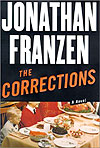The Corrections

PAGE 3
Reading Group Discussion Questions
View printable version
The questions, discussion topics, and suggested reading list that follow are intended to enhance your group's reading of Jonathan Franzen's The Corrections, an unflinchingly honest yet ultimately redemptive chronicle of an American family. We hope that they will help you approach the complex story of the Lamberts, which takes a hard look at the role of family in contemporary society and questions the effects of materialism in late-twentieth-century America.
If you are just beginning to read the book, use the first eight questions. As you read the book, come back for the next set of questions and discussion topics for your own book club discussions!
View printable version
The questions, discussion topics, and suggested reading list that follow are intended to enhance your group's reading of Jonathan Franzen's The Corrections, an unflinchingly honest yet ultimately redemptive chronicle of an American family. We hope that they will help you approach the complex story of the Lamberts, which takes a hard look at the role of family in contemporary society and questions the effects of materialism in late-twentieth-century America.
If you are just beginning to read the book, use the first eight questions. As you read the book, come back for the next set of questions and discussion topics for your own book club discussions!
-
Novels written in the nineteenth century often have plots with many characters and story lines. Novels from the 1980s and 1990s often have sparse plots with minimalist characters. What is the book's relation to these two models? Which elements of the book's style seem especially modern and which more traditional?
-
What role does corporate America play in this story? Consider the Midland Pacific takeover, Al's connections with the Axon Corporation, and Brian's dealings with the W¾ ¾ corporation. What are the lessons of Chip's Consuming Narratives class? Are they accurate and relevant? How should we view Melissa's critique of them [p. 42–44]?
-
What is the source of Gary and Caroline's marital problems? Whose version of the truth do you believe? Why does Gary feel so alienated from Caleb and Aaron? What draws him to Jonah? Compare this family with the glimpses we have of the young Lamberts. In what ways is Gary different, as a father, from Alfred?
-
Why does Denise choose to lose her virginity to Don Armour? Which qualities of her co-worker simultaneously attract and repel her? Why does Al sacrifice his job for Denise's privacy?
-
How do technology and consumerism infiltrate the lives of the characters? Are cell phones and the spy gadgets that Caleb craves symptoms of a problem in our society? How does consumerism relate to the problem of what Gary calls anhedonia—" a psychological condition characterized by inability to experience pleasure in normally pleasurable acts" [p. 165]?
-
How does the issue of class play out during the course of the novel? In what different ways does class drive Enid's behavior on the cruise and propel Denise's decision to sleep with Don Armour? How does concern over class status affect Gary and Caroline or Brian and Robin?
-
Are elements of the Lambert family universal characteristics of the American family? How does the world in general and family life in particular change during the half century that the novel spans? In what ways is life better now than when the Lambert children were young? In what ways is it worse?
-
Discuss the different moral codes members of the Lambert family adhere to. Consider Enid's fear of her children's "immorality," Gary's obsession with Caroline's dishonesty, Alfred's refusal to engage in insider trading, Denise's rage at Gary for having betrayed the sibling code of honor and Chip's animus against the W¾ ¾ Corporation and big business in general. Which of these judgments seem most valid? Does the book favor one moral view over another?



